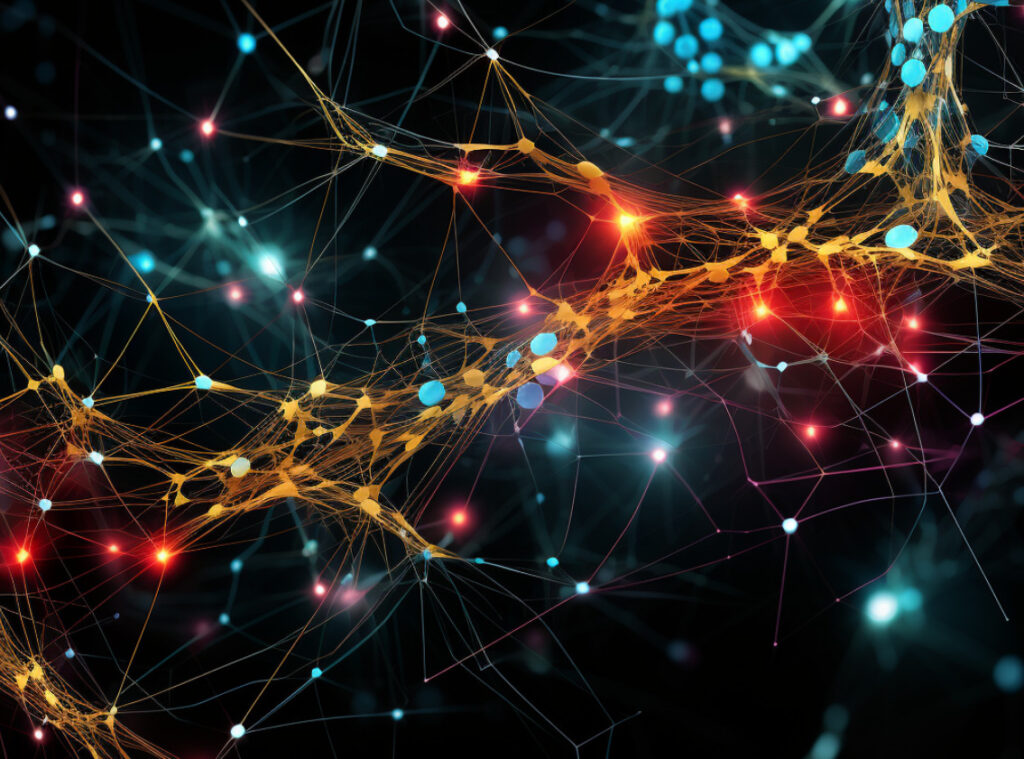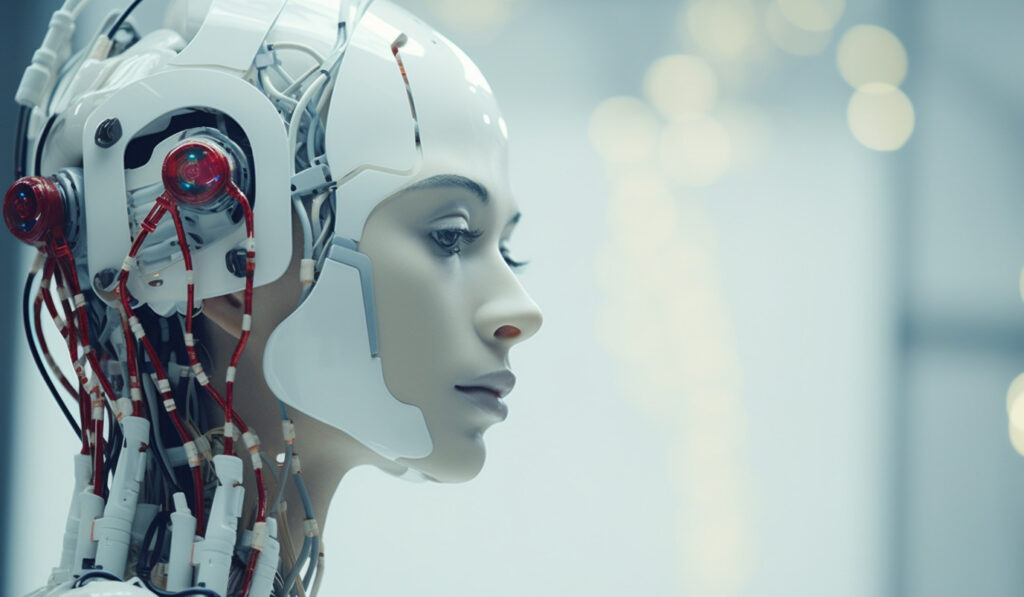
Nel panorama tecnologico contemporaneo, una forza trasformatrice emerge chiaramente: l’Intelligenza Artificiale (IA). L’IA sta rivoluzionando il nostro mondo in modi che avremmo faticato a immaginare solo qualche decennio fa. Questo articolo esplora le profonde implicazioni della crescita dell’IA e il suo impatto su aspetti fondamentali della società e dell’umanità.
La Rivoluzione delle AI è un fenomeno in continua evoluzione, alimentato da avanzamenti nella scienza dei dati, nell’apprendimento automatico e nella potenza di calcolo. Non si tratta semplicemente di macchine che eseguono compiti, ma di sistemi in grado di apprendere, adattarsi e prendere decisioni, spesso superando le capacità umane in campi specifici.
In questo articolo, esploreremo le sfide e le opportunità presentate dall’IA in settori chiave, come il futuro del lavoro, l’etica, l’assistenza sanitaria, l’industria automobilistica e molte altre aree. Vedremo come l’IA stia trasformando la nostra vita quotidiana e quale ruolo avrà nella costruzione del nostro futuro.

L’IA ha il potenziale per automatizzare una vasta gamma di compiti precedentemente eseguiti da esseri umani. Questo include lavori che coinvolgono attività ripetitive, calcoli complessi, analisi di grandi quantità di dati e molto altro. La conseguenza immediata è che alcune posizioni possono essere automatizzate, portando a domande sul futuro di professioni basate su compiti di routine.
Tuttavia, è importante notare che l’automazione non significa necessariamente la perdita di posti di lavoro. Molte industrie stanno sperimentando una riduzione delle mansioni ripetitive grazie all’IA, consentendo ai lavoratori di concentrarsi su compiti più creativi e di alto valore aggiunto.
L’IA non crea solo l’opportunità di automazione, ma anche la necessità di professionisti specializzati in questo campo. Esperti di machine learning, ingegneri del software orientati all’IA e scienziati dei dati sono solo alcune delle nuove figure professionali richieste per sviluppare, implementare e gestire sistemi di IA.
In sintesi, l’IA sta ridefinendo la natura stessa del lavoro. Mentre alcune posizioni potrebbero scomparire a causa dell’automazione, nuovi lavori creati dall’IA stanno emergendo. L’adattamento e l’apprendimento continuo diventano essenziali per i lavoratori del futuro mentre affrontano le sfide e le opportunità che l’IA porta con sé.
L’importanza dell’etica nell’IA è evidente quando consideriamo che le decisioni prese dai sistemi di intelligenza artificiale possono avere un impatto significativo sulla vita delle persone. Ad esempio, i sistemi di IA possono essere utilizzati per prendere decisioni critiche in campo medico, come la diagnosi di malattie, o per determinare l’accesso al credito finanziario. Ciò solleva domande fondamentali riguardo alla responsabilità delle decisioni prese dalle macchine e la necessità di garantire una maggiore trasparenza.
La discriminazione è un’altra preoccupazione etica chiave legata all’IA. Gli algoritmi di IA possono apprendere da dati storici che riflettono pregiudizi umani, portando a decisioni ingiuste o discriminanti. Questo solleva importanti domande riguardo alla necessità di sviluppare algoritmi etici e di monitorare attentamente l’addestramento dei sistemi di IA per evitare discriminazioni basate su razza, genere o altri fattori.
La trasparenza è un aspetto cruciale dell’IA etica. È importante comprendere come le decisioni vengano prese dagli algoritmi di IA e quali dati vengano utilizzati per addestrarli. La mancanza di trasparenza può rendere difficile identificare e correggere eventuali pregiudizi o errori nei sistemi di IA.

L’Intelligenza Artificiale (IA) sta rivoluzionando l’assistenza sanitaria in modi che avremmo faticato a immaginare solo pochi anni fa. Uno dei principali contributi dell’IA all’assistenza sanitaria è la sua capacità di analizzare grandi quantità di dati medici in modo rapido ed efficiente. I sistemi di IA possono esaminare le immagini diagnostiche, come le scansioni TC o le radiografie, per identificare anomalie o lesioni con una precisione straordinaria. Questo è particolarmente utile nella diagnosi precoce del cancro e di altre patologie gravi.
Inoltre, l’IA può analizzare i dati dei pazienti, come registri elettronici delle cartelle cliniche, per identificare tendenze e predire il rischio di malattie. Ciò consente una gestione più proattiva della salute dei pazienti e un intervento preventivo più efficace.
L’automazione è un altro aspetto chiave dell’IA nell’assistenza sanitaria. I chatbot basati sull’IA possono fornire assistenza ai pazienti, rispondendo a domande comuni e raccogliendo informazioni sui sintomi. Questo può migliorare l’accesso alle cure e alleggerire il carico di lavoro del personale sanitario.
L’IA sta anche contribuendo allo sviluppo di terapie personalizzate. I sistemi di IA possono analizzare i dati genetici dei pazienti per identificare trattamenti mirati e adattati alle esigenze individuali.
L’IA sta migliorando la diagnosi, il trattamento e la gestione delle malattie. Tuttavia, è importante affrontare le sfide associate all’adozione di questa tecnologia in modo da garantire che migliori effettivamente la qualità delle cure e sia utilizzata in modo etico e responsabile.
Una delle applicazioni più evidenti dell’IA è nei veicoli autonomi. Questi veicoli sono dotati di sensori avanzati, telecamere e sistemi di elaborazione dati che consentono loro di percepire l’ambiente circostante e prendere decisioni di guida in tempo reale. L’IA è al cuore di questa tecnologia, abilitando funzioni come il riconoscimento di ostacoli, la pianificazione del percorso e il mantenimento della corsia.
I veicoli autonomi promettono di trasformare il modo in cui ci spostiamo, riducendo il rischio di incidenti causati da errori umani e migliorando l’efficienza del traffico. Tuttavia, l’adozione su vasta scala di questa tecnologia solleva importanti sfide regolamentari ed etiche, come la responsabilità legale in caso di incidenti e la necessità di garantire la sicurezza dei veicoli contro eventuali minacce informatiche.
Oltre ai veicoli autonomi, l’IA è impiegata nell’ottimizzazione dei trasporti pubblici e nella gestione del traffico. Sistemi intelligenti possono analizzare flussi di traffico in tempo reale e fornire indicazioni per migliorare la circolazione e ridurre la congestione.
L’IA sta anche contribuendo alla sostenibilità ambientale nei trasporti. I veicoli elettrici alimentati da sistemi di IA per l’ottimizzazione del consumo energetico stanno emergendo come una soluzione per ridurre l’inquinamento e migliorare l’efficienza dei veicoli.

In campo scientifico, la capacità dell’IA di elaborare grandi quantità di dati con velocità e precisione straordinarie sta portando a avanzamenti sorprendenti. Ad esempio, nell’astronomia, l’IA è utilizzata per analizzare grandi set di dati dai telescopi spaziali, consentendo la scoperta di nuove galassie e oggetti celesti.
Nelle scienze biologiche, l’IA viene utilizzata per analizzare complessi dati genomici, accelerando la ricerca sulla genetica e sulla medicina personalizzata. In medicina, l’IA aiuta nella diagnosi precoce delle malattie, individuando pattern nei dati che sfuggirebbero all’occhio umano.
L’IA ha un ruolo cruciale nella simulazione di processi complessi. Nei settori della fisica e della chimica, l’IA può simulare interazioni atomiche e molecolari a una scala che sarebbe altrimenti impossibile da raggiungere con metodi convenzionali. Questo apre nuove opportunità per la progettazione di materiali innovativi e la scoperta di nuovi farmaci.
Nelle scienze sociali, l’IA è utilizzata per analizzare il comportamento umano e le tendenze culturali. L’analisi dei dati dei social media, ad esempio, può fornire insights sulle dinamiche sociali e sulla diffusione delle informazioni.
L’ascesa dell’IA non ha solo un impatto tecnologico ed economico, ma sta anche scuotendo le fondamenta della nostra società e cultura. L’IA sta cambiando il modo in cui ci connettiamo e comuniciamo.
Chatbot, assistenti vocali e algoritmi di raccomandazione influenzano ciò che vediamo e leggiamo online. Questo solleva domande riguardo alla personalizzazione delle informazioni e al rischio di creare “bolle informative” in cui le persone sono esposte solo a punti di vista simili ai loro.
Le interazioni umane stanno diventando sempre più ibride con le macchine. Gli assistenti vocali come Siri e Alexa sono diventati parte integrante della vita quotidiana, svolgendo compiti che una volta richiedevano l’interazione con altri esseri umani. Questo solleva domande sulla natura stessa dell’umanità e su cosa significhi essere “sociale”.
Nel mondo dell’arte e della cultura popolare, l’IA sta contribuendo a generare nuove forme di espressione. Musicisti e artisti stanno sperimentando con l’uso dell’IA per creare opere d’arte e composizioni musicali uniche. Allo stesso tempo, la creazione automatizzata di contenuti solleva domande sulla creatività e l’autenticità e sul copyright.
L’IA sta anche influenzando il settore dell’istruzione e dell’apprendimento. I sistemi di tutoraggio basati sull’IA possono adattare l’insegnamento alle esigenze individuali degli studenti, migliorando l’efficacia dell’apprendimento. Tuttavia, c’è una discussione in corso su come bilanciare l’uso dell’IA con l’importanza dell’educazione umana e dell’interazione.

L’Intelligenza Artificiale (IA) ha aperto nuove frontiere nella sicurezza informatica, ma ha anche portato con sé nuove minacce e sfide. L’IA ha rivoluzionato la capacità di rilevare e rispondere alle minacce cibernetiche. Gli algoritmi di IA possono analizzare grandi quantità di dati per individuare modelli sospetti, identificando potenziali attacchi in modo più rapido ed efficiente rispetto ai metodi tradizionali.
Tuttavia, l’IA può anche essere utilizzata da attaccanti informatici per aumentare la sofisticazione dei loro attacchi. Gli attaccanti possono sfruttare l’IA per automatizzare attacchi di phishing, generare malware personalizzati e sfruttare vulnerabilità più rapidamente.
La crescente complessità delle reti neurali utilizzate nell’IA rende anche più difficile la comprensione e la prevenzione degli attacchi. Gli attacchi basati sull’IA possono sfuggire alle tradizionali misure di sicurezza, richiedendo approcci più avanzati per la difesa.
La protezione dei dati personali e la privacy sono ulteriori preoccupazioni nell’era dell’IA. L’IA può analizzare grandi dataset per identificare informazioni sensibili, sollevando domande sulla raccolta e l’uso dei dati da parte delle aziende e dei governi.
L’IA sta trasformando il panorama della sicurezza cibernetica, offrendo nuovi strumenti per la difesa e al contempo presentando nuove sfide legate agli attacchi basati sull’IA. La collaborazione tra esperti di sicurezza, ricercatori e sviluppatori di IA è essenziale per sviluppare soluzioni efficaci e proteggere la nostra infrastruttura digitale in un mondo sempre più connesso e automatizzato.
L’IA è una forza trainante di innovazione. Ha il potenziale per migliorare radicalmente settori come la medicina, l’industria, la ricerca scientifica e la mobilità. Le applicazioni sono virtualmente illimitate, e la sua diffusione sta aprendo nuove strade per l’umanità.
Tuttavia, con questo potenziale vi sono importanti responsabilità. La sicurezza cibernetica e l’etica dell’IA sono questioni cruciali. Dobbiamo garantire che l’IA sia utilizzata in modo sicuro, rispettando i principi etici e proteggendo la privacy dei dati. La trasparenza e la responsabilità sono fondamentali.
L’IA solleva anche interrogativi sull’occupazione e sulla formazione. Mentre l’automazione può cambiare il volto del lavoro, può anche creare nuove opportunità. La formazione continua e l’adattamento diventano essenziali.
La collaborazione è fondamentale per il successo dell’IA. Governi, industrie, accademie e la società civile devono lavorare insieme per sviluppare politiche, standard e regolamentazioni adeguate. Questa tecnologia non può essere lasciata all’arbitrio del mercato o dei singoli attori.
Infine, dobbiamo affrontare l’IA con un occhio all’umanità. L’IA è uno strumento al servizio dell’umanità, non un sostituto. Dobbiamo mantenere la nostra centralità nella decisione, nell’etica e nel controllo di questa tecnologia.
Mentre ci dirigiamo verso il futuro dell’IA, dobbiamo farlo con una visione chiara e con l’impegno di utilizzare questa tecnologia per migliorare il nostro mondo. La strada può essere complicata, ma navigandola con saggezza e responsabilità, possiamo realizzare il potenziale straordinario dell’IA per il bene comune.
Ti è piaciuto questo articolo? Ne stiamo discutendo nella nostra Community su LinkedIn, Facebook e Instagram. Seguici anche su Google News, per ricevere aggiornamenti quotidiani sulla sicurezza informatica o Scrivici se desideri segnalarci notizie, approfondimenti o contributi da pubblicare.

 Cybercrime
CybercrimeLe autorità tedesche hanno recentemente lanciato un avviso riguardante una sofisticata campagna di phishing che prende di mira gli utenti di Signal in Germania e nel resto d’Europa. L’attacco si concentra su profili specifici, tra…
 Innovazione
InnovazioneL’evoluzione dell’Intelligenza Artificiale ha superato una nuova, inquietante frontiera. Se fino a ieri parlavamo di algoritmi confinati dietro uno schermo, oggi ci troviamo di fronte al concetto di “Meatspace Layer”: un’infrastruttura dove le macchine non…
 Cybercrime
CybercrimeNegli ultimi anni, la sicurezza delle reti ha affrontato minacce sempre più sofisticate, capaci di aggirare le difese tradizionali e di penetrare negli strati più profondi delle infrastrutture. Un’analisi recente ha portato alla luce uno…
 Vulnerabilità
VulnerabilitàNegli ultimi tempi, la piattaforma di automazione n8n sta affrontando una serie crescente di bug di sicurezza. n8n è una piattaforma di automazione che trasforma task complessi in operazioni semplici e veloci. Con pochi click…
 Innovazione
InnovazioneArticolo scritto con la collaborazione di Giovanni Pollola. Per anni, “IA a bordo dei satelliti” serviva soprattutto a “ripulire” i dati: meno rumore nelle immagini e nei dati acquisiti attraverso i vari payload multisensoriali, meno…